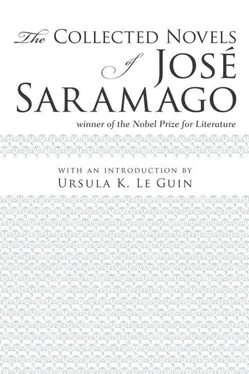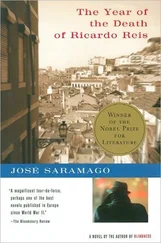Their entrance into the dining room was unanimously greeted with smiles and little deferential nods. Salvador, his annoyance forgotten or diplomatically suppressed, threw open the glass-paneled doors, and Ricardo Reis and Marcenda walked in front as etiquette demanded, he is their guest. From where we are standing we can scarcely hear the radio, there would be much food for thought if it should happen to be the wedding march from Lohengrin or the one by Mendelssohn or, less well known, perhaps because it is played as the prelude to disaster, the one in Lucia di Lammermoor by Donizetti. Needless to say, the table where they will sit is that of Doctor Sampaio, which is invariably waited upon by Felipe, but Ramón does not abdicate his prerogative, he will assist his colleague and compatriot. Both of them were born in Villagarcia de Arosa, it is the destiny of humans to follow their own distinct paths in life. Some have followed theirs from Galicia to Lisbon, while this man Reis was born in Oporto, for a time lived in the capital, then emigrated to Brazil, and the two people with him have been shuttling back and forth between Coimbra and Lisbon for the last three years. Each is searching, for a cure, for money, for peace of mind, for pleasure, each has his own goal, which explains why it is so difficult to satisfy all who are in need. The dinner passes tranquilly. Marcenda is seated on her father’s right, her left hand reclining as usual at the side of her plate, but curiously enough it is not hiding, on the contrary, it almost appears to glory in being seen, and if you think that word excessive, then you certainly haven’t heard how ordinary people speak. Let us not forget, either, that this hand has rested in the hands of Ricardo Reis, and how should it feel if not glorious. Marcenda’s disability is not discussed, the noose has been mentioned far too often already in the house of this woman condemned to the gallows. Doctor Sampaio is speaking of the wonders of the Athens of Portugal, There I was born into the world, there I was reared, there I graduated, there I exercise my profession, I swear the city is incomparable. His style is vigorous, but there is no danger of entering into an argument at the table about the merits of Coimbra compared with other cities, whether Oporto or Villagarcia de Arosa. Ricardo Reis does not care where one was born, and Felipe and Ramón would never dare to join in the conversation. They know their place, which is not the place of their birth. It was inevitable that Doctor Sampaio should learn that Ricardo Reis had gone to Brazil for political reasons, although it is hard to say how he learned it. Salvador did not tell him, because he does not know either, nor did Ricardo Reis confide it, but certain things are gleaned from broken words, moments of silence, a glance. He only had to say, I left for Brazil in nineteen nineteen, the year in which the monarchy was restored in the north, he only had to use a certain tone of voice, and the notary’s sharp ear, accustomed to listening to falsehoods, oaths, confessions, was not deceived. It was inevitable, then, that the conversation should turn to politics. By indirect routes, testing the ground, trying to detect hidden mines or snares, but feeling incapable of changing the topic, Ricardo Reis allowed himself to be carried along, and before the dessert he had already stated that he had no faith in democracies and heartily despised socialism. You’re among friends, Doctor Sampaio assured him with a smile. Marcenda showed little interest in their conversation, for some reason she placed her left hand on her lap. If there had been glorying, it was now burned out. What we need, my dear Reis, in this corner of Europe, is a man of vision and firm resolve to head our government and run the country. These were the words spoken by Doctor Sampaio, who continued, There is no possible comparison between the Portugal you knew when you left for Rio de Janeiro and the Portugal you have come back to find, I know that you have only recently returned, but if you have been around and kept your eyes open, you must have noticed enormous changes, greater prosperity, public order, a coherent plan to encourage patriotism, the respect of other nations for the achievements of our fatherland, for its secular history and empire. I haven’t seen much, Ricardo Reis confessed, but I’m up to date on what is reported in the newspapers. The newspapers must be read, of course, but that is not enough, you must see with your own eyes the roads, the ports, the schools, the public works everywhere, and the atmosphere of discipline, my dear fellow, the calm on the streets and in people’s hearts, an entire nation dedicated to honest labor under the leadership of a great statesman, truly an iron hand in a velvet glove, precisely what we needed. A splendid metaphor, that. Yes, I’m sorry not to have invented it myself, it stuck in my mind, how true it is that a single image can be worth a hundred speeches, it appeared two or three years ago on the front page of Sempre Fixe, or was it Os Ridículos , an iron hand in a velvet glove, and the drawing was so excellent that both the velvet and the iron were conveyed. In a satirical magazine. Truth, dear Doctor Reis, does not always choose the place. It remains to be seen if the place always chooses the truth. Doctor Sampaio frowned a little, the contradiction disturbing him somewhat, but he treated the remark as if it were too profound to be discussed then and there among the wines from Colares and the cheeses. Self-absorbed, Marcenda nibbled little bits of rind, she raised her voice to say that she did not want any dessert or coffee, then began a sentence which might have diverted the conversation to Ta Mar, but her father went on, It’s not a literary masterpiece but it’s certainly a useful book, easy to read, and should open many people’s eyes. What is the book. The title is Conspiracy, written by a patriotic journalist, a nationalist, a certain Tomé Vieira, I don’t know whether you’ve heard of him. No, I haven’t, living so far away. The book was published only a few days ago, you really must read it and give me your opinion. I’ll certainly read it if you recommend it with such enthusiasm. Ricardo Reis was beginning to regret that he had declared himself anti-socialist, anti-democratic, and also anti-Bolshevik, not because he was not all these things but because he was growing tired of such unrelieved nationalism, perhaps even more tired at not having been able to speak to Marcenda. As it so often happens, the thing left undone tires you most of all, you only feel rested when it has been accomplished.
The dinner at an end, Ricardo Reis drew back Marcenda’s chair and allowed her to walk ahead with her father. Once outside, all three hesitated, wondering whether they should pass into the lounge, but Marcenda finally decided to retire to her room, complaining of a headache. Tomorrow we probably will not see each other, we are leaving early, she told him. Ricardo Reis wished them a good journey, Perhaps I will still be here when you return next month. Should you be gone, do leave us your new address, Doctor Sampaio urged him. Now there is nothing more to be said, Marcenda will go to her room, she has or claims to have a headache, Ricardo Reis does not know what he wants to do, Doctor Sampaio will be going out again later this evening.
Ricardo Reis also went out. He wandered, went into various cinemas to look at the posters, watched a game of chess, white won, and it was raining when he left the café, so he took a taxi back to the hotel. Entering his room, he noticed that the covers had not been turned back and that the second pillow had not been removed from the closet. Vague, foolish sorrow stops at the door of my soul, stares at me awhile, and moves on, he murmured, smiling to himself.
Читать дальше












